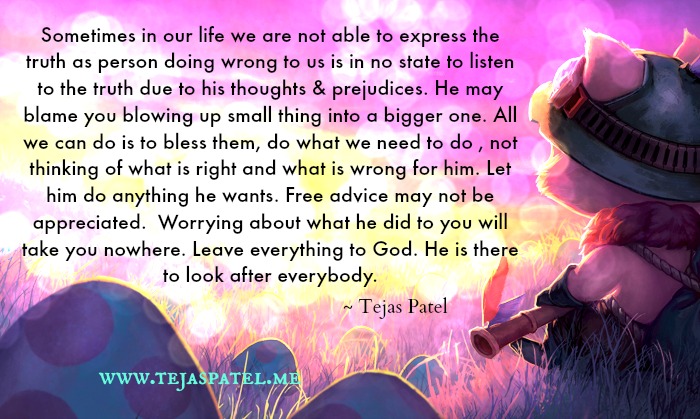Sometimes in our life we aren’t able to express the truth as person doing wrong to us is in no state to listen to the truth due to his thoughts & prejudices. He may blame you blowing up small thing into a bigger one. All we can do is to bless them, do what we need to do , not thinking of what is right and what is wrong for him. Let him do anything he wants. Free advice may not be appreciated. Worrying about what he did to you will take you nowhere. Leave everything to God. He is there to look after everybody. ~ Tejas Patel
The Power of Forgiveness: Letting Go of Resentment and Blame
Have you ever felt wronged by someone, only to find that they’re unable to listen to the truth due to their own biases and prejudices? It’s a frustrating and hurtful experience, isn’t it? You might feel like you’re stuck in a never-ending cycle of anger and resentment, wondering why they can’t just see things from your perspective.
But what if I told you that the only way to break free from this cycle is to let go of the need for them to acknowledge their wrongdoing? It’s not about what they think or feel; it’s about what you choose to do with your emotions. The quote above reminds us that sometimes, the best we can do is bless those who have hurt us and move on.
But it’s not always easy, is it? Our natural instinct is to want to express our feelings and demand justice. And yet, we know that venting our emotions may not always be productive or appreciated. In fact, it may even lead to more conflict and hurt.
So, what’s the alternative? Well, instead of worrying about what the other person did to us, we can focus on what we can control – our own thoughts and actions. We can choose to let go of the need for revenge or validation, and simply do what’s right for us. We can take care of ourselves, surround ourselves with supportive people, and practice self-compassion.
And as we do this, we begin to realize that the power of forgiveness is not about forgetting what happened or excusing the other person’s behavior. It’s about releasing the emotional burden that comes with holding onto resentment and anger. It’s about freeing ourselves from the weight of bitterness and moving towards a more peaceful, loving place.
Of course, this doesn’t mean that we have to forget what happened or condone the other person’s behavior. It simply means that we’re choosing not to let their actions define our own happiness and well-being. We’re choosing to focus on our own growth, rather than dwelling on the past.
So, how can we apply this wisdom in our daily lives? Here are a few practical tips:
- Practice self-compassion: Treat yourself with kindness and understanding, just as you would a close friend.
- Focus on what you can control: Instead of worrying about what others think or do, focus on what you can control – your own thoughts and actions.
- Let go of resentment: Choose to release the negative emotions associated with a painful experience and focus on healing and moving forward.
- Seek support: Surround yourself with people who uplift and support you, rather than those who bring you down.
- Trust in God: Remember that God is always there to guide and support you, even when things seem difficult or uncertain.
In conclusion, forgiveness is a powerful tool that can set us free from the cycle of resentment and anger. It’s not about forgetting what happened or excusing others’ behavior; it’s about releasing our own emotional burden and moving towards a more peaceful, loving place. By applying these principles in our daily lives, we can break free from the chains of bitterness and live a more fulfilling life filled with love, joy, and peace.




